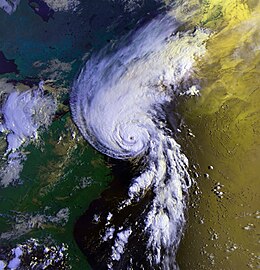Hurricane Bob was an Atlantic tropical cyclone during August 1991. It was one of the costliest hurricanes in the history of New England.
| Category 3 major hurricane (SSHWS/NWS) | |
 Hurricane Bob approaching New England | |
| Formed | August 16, 1991 |
|---|---|
| Dissipated | August 29, 1991 |
| (Extratropical after August 20) | |
| Highest winds | 1-minute sustained: 115 mph (185 km/h) |
| Lowest pressure | 950 mbar (hPa); 28.05 inHg |
| Fatalities | 15 direct, 2 indirect |
| Damage | $1.5 billion (1991 USD) |
| Areas affected | North Carolina, Mid-Atlantic states, New England and Atlantic Canada |
| Part of the 1991 Atlantic hurricane season | |
The storm began from an area of low pressure near the Bahamas. The area steadily became stronger and was upgraded to Tropical Storm Bob later on August 16.
It curved to the north-northwest at first. However, after the storm became a hurricane, it turned to the north-northeast on August 17.
The track of Hurricane Bob by August 18 and 19 was similar to 1954's Hurricane Carol, another storm that affected North Carolina and New England.[1] Bob brushed eastern North Carolina on August 18 and early on the 19th.
The storm moved up the Mid Atlantic on August 19; it passed just east of Long Island. The storm then crossed Block Island, Rhode Island, and later hit near Newport that afternoon.
While Bob affected Rhode Island, the strong winds moved westward into Connecticut. In that state, winds peaked near 75 mph.
The most damage happened in Massachusetts. Total damage there was $1 billion.[2]
The storm weakened to a strong tropical storm; it then hit Maine with 70 mph winds and heavy rain.
Damage from Bob totaled $1.5 billion. Eighteen people were killed as a result of the storm.
The name Bob was retired in the spring of 1992 and replaced with Bill.
References
change- ↑ "Hurricane Bob". NOAA. Retrieved Feb 1, 2018.
- ↑ "Storm Season is Over". Google. Retrieved Feb 1, 2018.